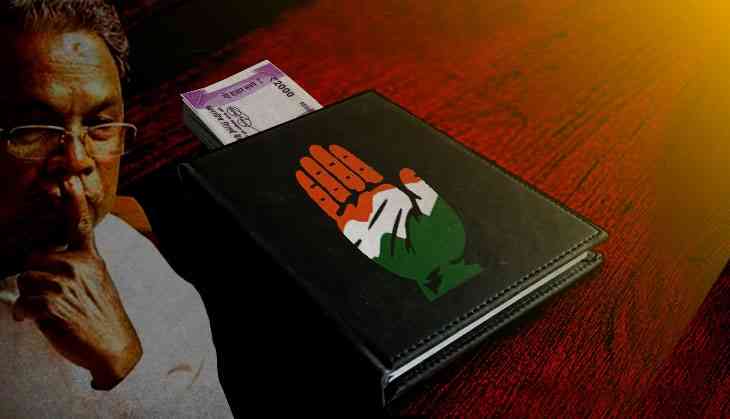Karnataka: Does the 'Govindaraju diary' reveal pay-offs to Congress bigwigs?

The BJP's declared agenda of creating a “Congress mukht Bharat” has received a boost -- a diary found in a Congress leader’s house in Karnataka purportedly contains explosive material on alleged payments to the party's high command.
Karnataka, the last major bastion of the Congress, is due to go to polls by April next year. In the run-up, the BJP government at the Centre has begun targeting the Siddaramaiah regime, and it is finding enough grime to put it in the dock.
SA Govindaraju, MLC and parliamentary secretary to the chief minister, in whose house the diary was found by Income Tax authorities during a raid in June 2016, is a close associate and known fundraiser of Siddaramaiah.
Also Read: From crusaders to scamsters: what corrupted the Karnataka Lokayukta
It was Govindaraju who had accompanied Siddaramaiah to Brussels last year when the chief minister's son Rakesh, who was holidaying in Europe, died of a sudden hemorrhage.
Nothing was known about the diary until state BJP chief and former chief minister BS Yeddyurappa dropped the “bomb” last week, alleging that the diary contained detailed information about Siddaramaiah and his colleagues “feeding” around Rs 1,000 crore to the Congress bigwigs.
Yeddyurappa also alleged that Bengaluru Development Minister KJ George had struck a deal for Rs 150 crore with the contractors of the controversial steel bridge planned to be built in the city and that Rs 65 crore had already been paid in bribes.
When local TV channels went to town with Yeddyurappa’s allegations, the Congress was pushed on the back foot and denied the very existence of the diary. But, by evening the same day, a Kannada channel gave the Congress leaders an edited version of a chat between Yeddyurappa and Ananth Kumar at a public function, where they allegedly discussed payments made to “their” party bosses.
It later emerged, though, that the conversation pertained to Ananth Kumar’s telephonic talk with Siddaramaiah, where the latter downplayed the amount paid to the party leaders. Both Kumar and Yeddyurappa shared a hearty laugh about how they had found an stick to beat the ruling party with until the assembly election.
Siddaramaiah, on his part, accused the central agencies of being hand in glove with state BJP leaders and challenged Yeddyurappa to produce the diary.
Govindaraju, who now denies the diary is his, had earlier written to the IT department enquiring whether they had shared any diary or information with the BJP leaders. He had also claimed that he was not at home when the raid took place and wasn’t aware of what the IT officials had found there.
It was Times Now which “broke” the story of the diary, allegedly at the instance of Union Finance Minister Arun Jaitley. The channel said the diary, in which the amounts “received” and “paid” are recorded by hand, mentions about Rs 600 crore being transacted. Specific amounts have been mentioned against “mysterious” initials such as “AICC”, “AP”, “M Vora”, “RG office”, “SG office”, “DGS”.
Speculation in the media claims “AP” stands for Ahmed Patel, “M Vora” for Motilal Vora, “RG office” for Rahul Gandhi’s office, “SG office” for Sonia's office and “DGS” for Digvijaya Singh.
Also Read: BJP swallows bitter pill: Yeddyurappa given charge of Karnataka unit
The diary purportedly also has entries against the “initials” of prominent ministers in Karnataka, from whom crores of rupees have allegedly been collected. The ministers whose “initials” purportedly appear in the diary are KJ George, MB Patil, HC Mahadevappa, DK Shivakumar, RV Deshpande, Ramalinga Reddy. Former Bangalore Development Authority chief Sham Bhat, BDA senior engineer Raghu, former police officer and CM's advisor Kempaiah are also allegedly mentioned.
KJ George, one of the chief fundraisers for the Congress party in Karnataka, had been forced to resign as home minister last year after his name cropped up in a case of alleged suicide by a police officer. The government instituted an enquiry which gave George a clean chit and he was back in the cabinet in less than two months.
Since the news of the diary broke, all ministers concerned have admitted that the IT officials have called them with questions, but they have all denied that the initials mentioned in the diary have anything to do with them.
They also questioned how Prime Minister Narendra Modi had been “let-off” after he allegedly figured in the SaharaBirla diaries as having received money from the corporate houses when he was the chief minister of Gujarat.
Legal experts are divided on whether the “Govindaraju diary” can stand up to scrutiny in a court of law, especially after the Supreme Court had rejected the contents of Sahara-Birla diaries as being “without merit” and “inadmissible”.
A senior advocate who did not wish to be named, however, contended that this diary is “materially different” from other diaries and has better chance of being accepted as a piece of evidence. He said one of the main reasons for the SC rejecting the Sahara diary was that it was in the form of loose Excel sheets and printouts and not an “account book”. The “Govindaraju diary”, on the other hand, is hand written with a continuous sequence of entries and there are no loose additional sheets with it.
More importantly, the ownership of the Sahara-Birla diaries could not be established, while Govindaraju had admitted that the diary belonged to him. Also, Govindaraju’s proximity to the chief minister and the “capacity” of the ministers mentioned in the diary could not be denied, the advocate argued.
But one would reckon that more than proving facts in a court of law, the BJP would be happier to make an impact in the people’s court, such that would help bring it back to power in Karnataka.
Also Read: Prashant Bhushan: There's already more evidence in Sahara & Birla papers than in Jain hawala dairies


